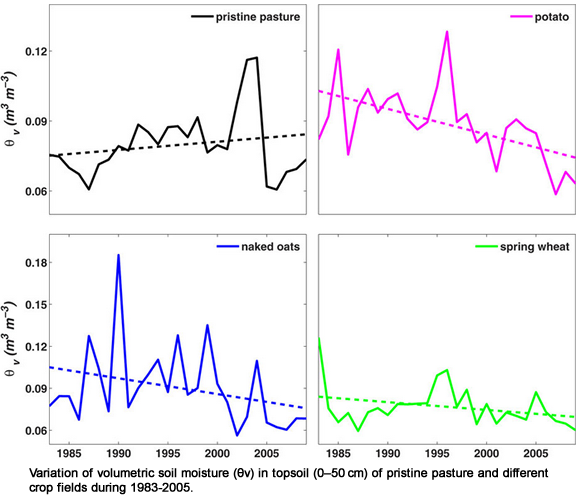 According to research led by Purdue University and China Agricultural University, an important agricultural region in China is drying out and increased farming may be to blame. The study — spanning 30 years of data — found that soil moisture has decreased by 6% since 1983 in Northern China. The soil in the region is now at less than 40% of its water holding capacity, while the optimal moisture levels are typically 40% to 85%. Researchers believe if this trend continues, the soil may not be able to support crops by as early as 2090. Understand, 40% of the nation’s population resides in Northern China and the region accounts for 65% of the nation’s cropland. What’s most interesting about this study is that usually when you see soil moisture losses, its due in a large part from changing climate — rising temperatures and less rain. However, this study suggests water depletion appears to be largely driven by human agricultural activities. The study lasted from 1983 to 2009 at two sites, one agricultural and another at an unspoiled grassland. A significant drying trend was discovered in the soil moisture of the agricultural site while a slight increase in moisture was recorded in the grassland. A consistent trend in decreasing of soil moisture correlated with increased usage of fertilizers. The researchers explain that fertilizer has long been overused in China, which accounts for 31.4% of global consumption. In addition to increased fertilizer usage, increasing soil irrigation, caused by the heightened demand for water of newly developed crop species, also leads to increased draw upon the surface and groundwater resources. Drying soil in Northern China has been well studied, but the impacts of agricultural intensification in general on this region have been little understood. The researcher believe their study shows a clear correlation with increased fertilizer usage and proliferation of crops with high water demands though, and say it underscores the importance of developing sustainable agricultural practices. It’s clear the Chinese government recognizes the problem,as they actually sanctioned the study. The question is whether the government is ready to do something? Food security remains one of the state’s paramount concerns, so promoting agricultural approaches that might decrease production may have a tough time gaining any traction. Overall, the problem really is an enormous one, and it needs to be addressed sooner rather than later as the depleted soil and water resources will take years, even decades to recover.
According to research led by Purdue University and China Agricultural University, an important agricultural region in China is drying out and increased farming may be to blame. The study — spanning 30 years of data — found that soil moisture has decreased by 6% since 1983 in Northern China. The soil in the region is now at less than 40% of its water holding capacity, while the optimal moisture levels are typically 40% to 85%. Researchers believe if this trend continues, the soil may not be able to support crops by as early as 2090. Understand, 40% of the nation’s population resides in Northern China and the region accounts for 65% of the nation’s cropland. What’s most interesting about this study is that usually when you see soil moisture losses, its due in a large part from changing climate — rising temperatures and less rain. However, this study suggests water depletion appears to be largely driven by human agricultural activities. The study lasted from 1983 to 2009 at two sites, one agricultural and another at an unspoiled grassland. A significant drying trend was discovered in the soil moisture of the agricultural site while a slight increase in moisture was recorded in the grassland. A consistent trend in decreasing of soil moisture correlated with increased usage of fertilizers. The researchers explain that fertilizer has long been overused in China, which accounts for 31.4% of global consumption. In addition to increased fertilizer usage, increasing soil irrigation, caused by the heightened demand for water of newly developed crop species, also leads to increased draw upon the surface and groundwater resources. Drying soil in Northern China has been well studied, but the impacts of agricultural intensification in general on this region have been little understood. The researcher believe their study shows a clear correlation with increased fertilizer usage and proliferation of crops with high water demands though, and say it underscores the importance of developing sustainable agricultural practices. It’s clear the Chinese government recognizes the problem,as they actually sanctioned the study. The question is whether the government is ready to do something? Food security remains one of the state’s paramount concerns, so promoting agricultural approaches that might decrease production may have a tough time gaining any traction. Overall, the problem really is an enormous one, and it needs to be addressed sooner rather than later as the depleted soil and water resources will take years, even decades to recover.